
10 Essential Mediation Types for Effective Conflict Resolution
Overview
This article explores the various types of mediation that are essential for effective conflict resolution. Each type, from family and workplace mediation to online and transformative mediation, offers unique approaches and benefits that can truly make a difference in our lives.
Have you ever found yourself in a conflict where communication seemed impossible? Mediation can be a powerful tool in these moments. It fosters understanding, preserves relationships, and helps achieve satisfactory outcomes in diverse disputes. For instance, family mediation can create a safe space for open dialogue, while workplace mediation can restore harmony among colleagues.
Consider the statistics that demonstrate mediation's effectiveness. These methods not only enhance communication but also empower individuals to navigate their conflicts constructively. By embracing mediation, we can pave the way for resolution and healing.
As you reflect on your own experiences, think about how mediation could help you or someone you know. We invite you to explore these mediation types further and consider how they might serve you in resolving conflicts compassionately and effectively.
Introduction
Mediation is quickly becoming the preferred choice for resolving conflicts, and it’s easy to see why. By 2025, projections suggest that an incredible 70% of individuals will favor mediation over traditional litigation. This shift reflects a growing understanding of how effective mediation can be in addressing disputes, whether they arise in family settings or workplace environments.
But with so many types of mediation available, how do you choose the right one for your unique situation? It’s important to explore the different mediation approaches, as each offers distinct benefits. By doing so, you can uncover the transformative potential they hold for fostering understanding and collaboration in resolving conflicts.
Imagine a scenario where you can navigate disagreements with empathy and support. Mediation not only provides a pathway to resolution but also nurtures a sense of community and connection. As you consider your options, remember that the right mediation approach can make all the difference in your journey toward harmony.
Conclude ADR: Comprehensive Mediation Services for Diverse Disputes
At Conclude ADR, we understand that encountering disputes can be challenging for both individuals and organizations. That's why we offer a varied selection of mediation types tailored to meet your unique needs. In fact, it's anticipated that by 2025, around 70% of individuals will turn to mediation types as their preferred method for resolving conflicts. This trend reflects a growing desire for efficient and effective management of disagreements.
Our experienced neutrals adopt a resolution-focused approach, ensuring that your conflicts are handled with the utmost care and expertise. We offer flexible scheduling options and a responsive team that guarantees prompt access, making it easier for you to engage with us. Our streamlined booking process simplifies your experience, enhancing accessibility and establishing Conclude ADR as a reliable ally in managing a range of conflicts—from personal disagreements to complex business matters.
Consider the successful case studies we've had, such as resolving a slip and fall incident, which demonstrate our effectiveness in settling serious conflicts quickly and affordably. As noted expert Allison C. Johs states, "Mediation types and arbitration, collectively known as Alternative Dispute Resolution (ADR), will continue to rise in 2025." This reinforces the importance of expert-driven solutions in achieving practical outcomes and fostering lasting resolutions.
Moreover, our commitment to value-based pricing and low fees ensures that you receive fair and efficient solutions tailored to your specific needs. We invite you to explore how Conclude ADR can support you in navigating your disputes with compassion and understanding.
Family Mediation: Resolving Conflicts Within Families
Family negotiation is an essential process for resolving conflicts within families, particularly in sensitive matters such as divorce, child custody, and inheritance issues. This approach fosters a safe space where family members can share their concerns openly and work together towards resolutions. By nurturing effective communication and understanding, family conflict resolution not only helps settle disputes but also plays a crucial role in preserving relationships and easing emotional distress.
Mediators play a vital role in these discussions, ensuring that every voice is heard and that the final agreement meets the needs and interests of all involved. Family therapists often advocate for negotiation, emphasizing its power to encourage collaborative problem-solving and allowing families to tailor agreements to their unique situations. In fact, many families now prefer negotiation over litigation in custody disputes, recognizing its ability to foster more amicable outcomes.
Consider the benefits of family conflict resolution, particularly in divorce and custody situations. Families that engage in alternative dispute resolution frequently report higher satisfaction levels with the outcomes compared to those who pursue traditional litigation. This collaborative approach not only helps in crafting solutions that honor past relationships but also establishes a positive foundation for future interactions, especially when children are involved. By minimizing discord and emotional strain, family negotiation emerges as a preferred choice, enabling families to address their disagreements with dignity and respect.
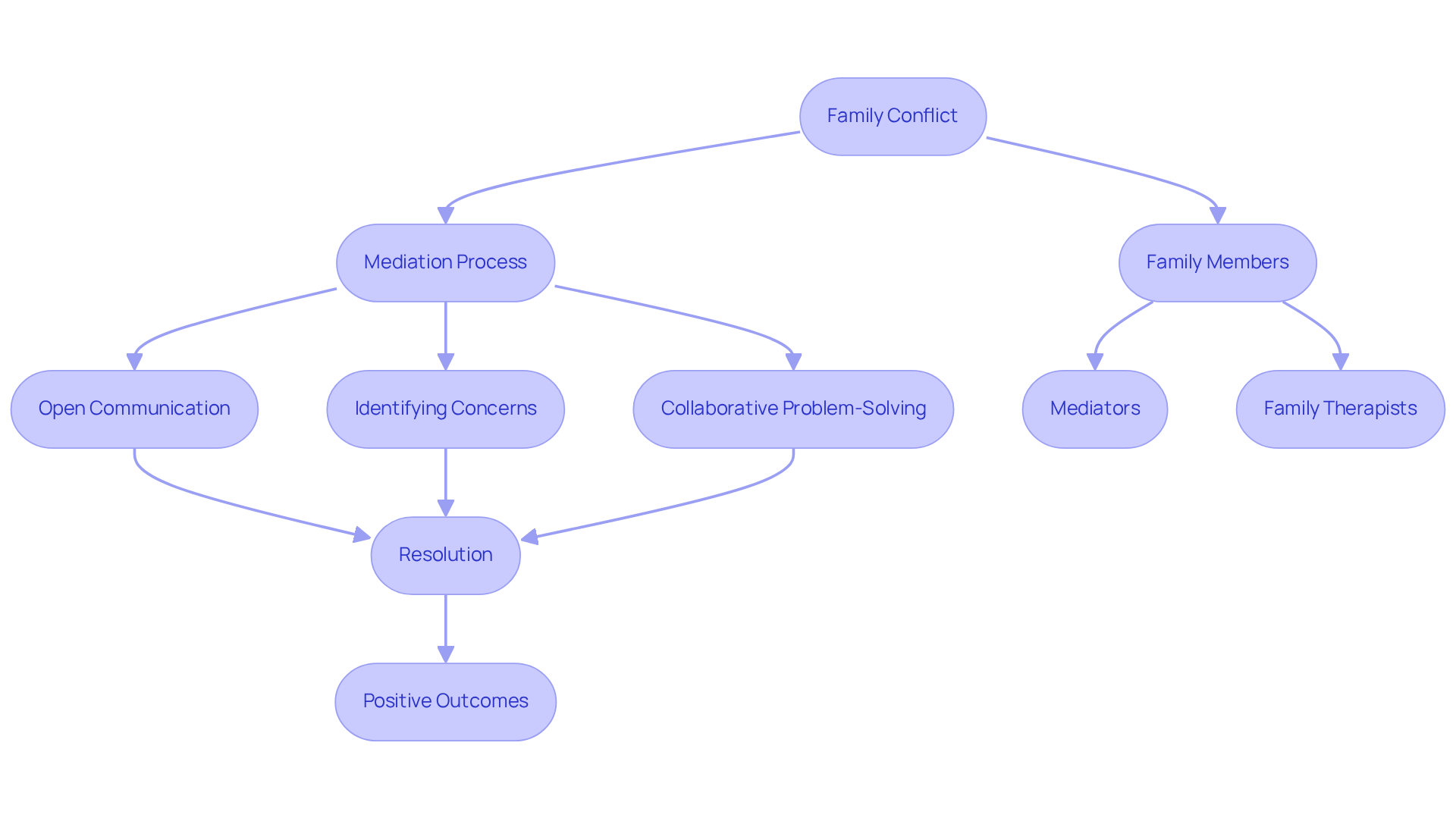
Workplace Mediation: Facilitating Harmony in Professional Environments
Workplace negotiation plays a crucial role in addressing conflicts that may arise between employees, teams, or management. It aims to restore harmony and enhance communication within the professional environment. By inviting an impartial intermediary to facilitate conversations, this approach allows participants to express their underlying concerns and work together toward mutually beneficial outcomes.
Interestingly, a 2013 survey of Fortune 1000 companies highlighted a growing trend away from relying solely on arbitration. Many firms are now embracing alternative dispute resolution as a proactive strategy to resolve workplace conflicts. This shift not only acknowledges the cost-effectiveness of conflict resolution but also promotes greater satisfaction among all parties involved compared to traditional litigation.
The negotiation process does more than just resolve immediate disputes; it equips employees with essential conflict resolution skills, fostering a more cooperative and efficient workplace. Successful examples of workplace conflict resolution illustrate its power in transforming team dynamics and enhancing employee relations. For instance, organizations like Coca-Cola Enterprises have implemented alternative dispute resolution programs centered on negotiation, leading to improved communication and reduced litigation costs. This initiative reflects a broader trend among Fortune 1000 companies that are adopting similar programs to address workplace disputes.
HR professionals strongly advocate for various mediation types as a vital tool in nurturing a positive workplace culture. They emphasize that it enables employees to voice their concerns openly and find common ground. As Diana Maier wisely notes, "Companies ought to think about employing a mediator in situations where two or more essential employees -- whom the company wishes to keep -- appear to be in a difficult disagreement." This approach not only addresses disputes but also strengthens relationships, ultimately fostering a healthier work atmosphere.
Isn't it reassuring to know that there are effective strategies available to navigate workplace conflicts? By engaging in various mediation types and negotiation, we can create a more supportive and collaborative environment for everyone involved.
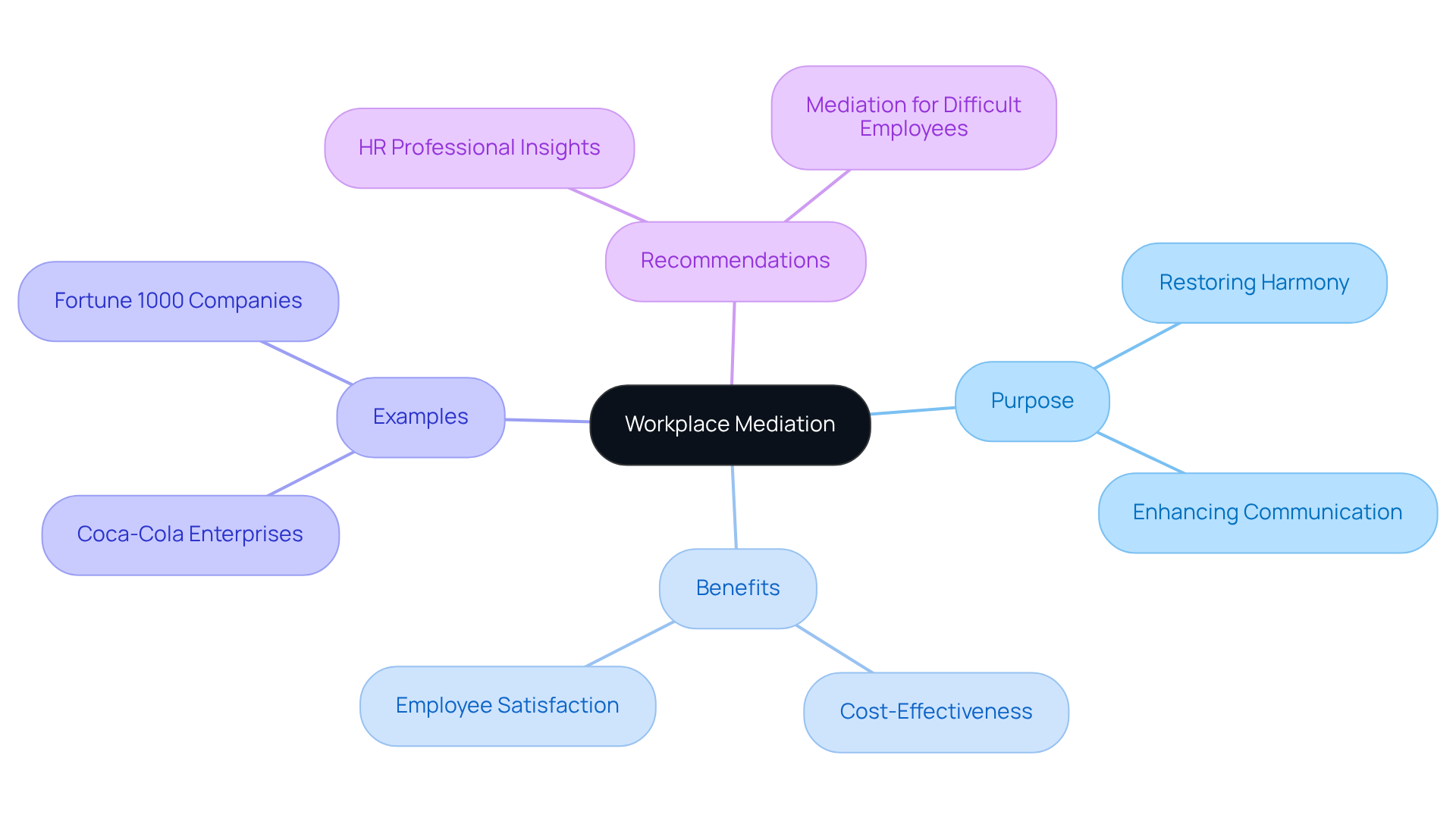
Commercial Mediation: Navigating Business Disputes Effectively
Commercial mediation is an invaluable resource for resolving disputes between businesses, including various mediation types such as contract disagreements, partnership conflicts, and supplier issues. This approach allows stakeholders to maintain control over the resolution process, fostering a cooperative atmosphere that encourages innovative solutions. By engaging a neutral mediator, businesses can avoid the significant costs and lengthy timelines often associated with litigation, all while preserving essential relationships.
Have you ever faced the stress of a legal dispute? The financial advantages of alternative dispute resolution are remarkable; businesses can save an average of 30% to 50% in legal expenses compared to traditional litigation. Moreover, conflict resolution typically settles disagreements more swiftly, often within weeks rather than months or years. This efficiency results in additional savings and minimizes operational interruptions.
Business leaders are increasingly recognizing the strategic benefits of negotiation. Many CEOs advocate for negotiation as a way to reduce legal expenses, protect corporate culture, and manage risks effectively. There are numerous successful examples, including a recent case where a major corporation resolved a contract dispute through negotiation, leading to a solution that not only satisfied both parties but also strengthened their ongoing business relationship.
Mediation types also play a crucial role in fostering a healthy corporate culture and promoting psychological safety among employees. It ensures that conflicts are resolved constructively, creating an environment of respect and accountability within organizations. It's essential for mediators to recognize potential power disparities and design processes that equalize conditions, ensuring that everyone involved can fully engage. Additionally, ensuring that parties have the authority to settle is vital for the enforceability of mediated agreements.
Ultimately, commercial negotiation addresses urgent issues while reinforcing a culture of respect and accountability within organizations. By resolving disagreements constructively, we can uphold relationships and create a more harmonious workplace.
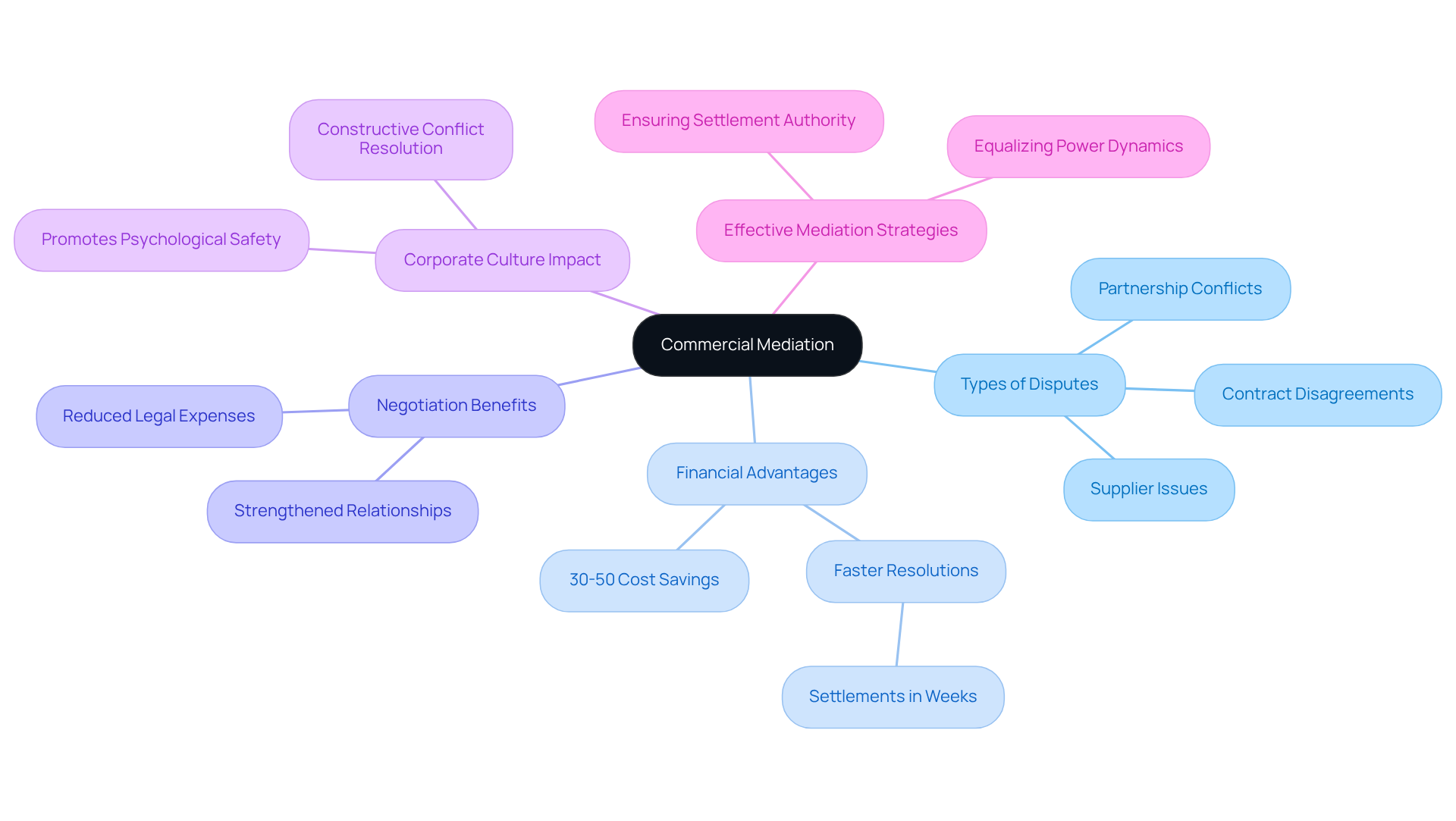
Community Mediation: Addressing Local Conflicts and Enhancing Relationships
Community dialogue plays a vital role in resolving disagreements within neighborhoods, such as neighbor disputes and landlord-tenant conflicts. This approach nurtures open communication and collaboration among community members, fostering understanding and respect. By addressing disputes locally, various mediation types not only resolve immediate issues but also strengthen relationships and enhance community cohesion.
Mediators create a safe space for discussion, gently guiding parties toward resolutions that benefit everyone involved. For instance, the City Prosecutor Community Mediation Program in Pasadena addresses various disputes, including landlord-tenant issues and homelessness-related challenges, with the aim of enhancing community relations and improving quality of life. This program seeks to prevent escalation to law enforcement or legal proceedings, and it is optional, complimentary, and private. It reflects a growing trend where communities increasingly turn to mediation types, including negotiation, as a means to settle neighborhood disputes.
Successful examples of different mediation types in community conflict resolution highlight its effectiveness. In Greenville, a community conflict resolution initiative tackled a dispute over a proposed shopping center by incorporating green spaces and local vendors, preserving the community's identity. Similarly, the integration of restorative justice principles in community conflict resolution has shown transformative outcomes, promoting accountability and enhancing social capital.
As communities embrace conflict resolution practices, they often witness a decrease in disputes and an increase in collaborative relationships. Local leaders emphasize the importance of these programs in strengthening community connections, with many neighborhoods recognizing the benefits of negotiation as a proactive approach to resolving conflicts.
Have you ever thought about how mediation could change your neighborhood for the better? By fostering understanding and collaboration, we can all contribute to a more harmonious community. Let's work together to create an environment where everyone feels heard and respected.
Peer Mediation: Empowering Individuals to Resolve Conflicts Among Themselves
Peer mediation types are transformative methods that empower individuals, particularly in educational settings, to assist their peers in resolving disputes. Have you ever felt overwhelmed by conflict? This approach not only encourages participants to actively engage in the resolution process but also nurtures essential skills like communication, empathy, negotiation, and understanding different mediation types. Trained peer mediators employ different mediation types to facilitate discussions between conflicting parties, guiding them toward solutions that everyone can accept.
Consider the City of Flint's Peer Mediation Program, launching on January 13, 2025, with 40 students from various schools already enrolled. This initiative is designed to enhance dispute resolution skills and promote leadership among youth by exploring different mediation types. Imagine a school environment where disruptions are minimized, and positive interactions flourish. Educators, such as Principal Christopher Ochobnicky, emphasize the program's commitment to helping at-risk students thrive academically, underlining the importance of responsible dispute management.
Statistics reveal that different mediation types, particularly peer intervention, significantly aid in resolving disputes, with many students reporting positive outcomes. The skills gained through peer facilitation, a type of mediation, extend beyond immediate conflict resolution, equipping students with the tools for effective communication and understanding in future interactions. As Latrese Brown, the program director, highlights, providing students with conflict resolution skills and training in mediation types is crucial for their growth and success. This approach not only fosters academic achievement but also cultivates critical life skills, ensuring that participants are well-prepared for the challenges they may encounter.
Together, we can create a supportive environment where students feel empowered to navigate conflicts with confidence.
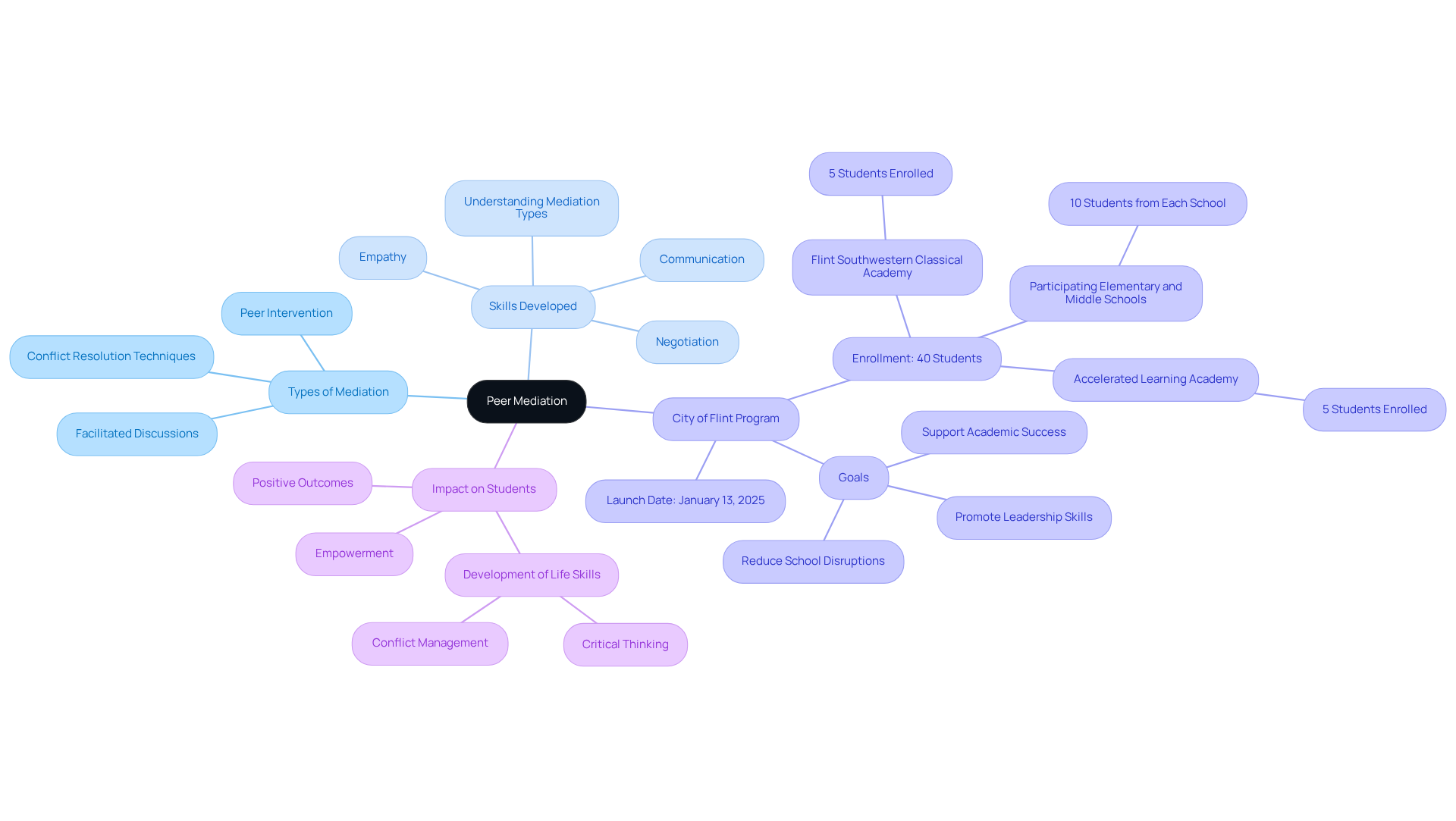
Online Mediation: Convenient Solutions for Remote Dispute Resolution
Online arbitration offers a flexible and accessible way to resolve disputes from anywhere, using video conferencing and digital tools to facilitate conversations among individuals, no matter their location. Imagine the relief of eliminating travel costs and saving precious time! This approach not only makes participation easier for everyone but also encourages those who might otherwise struggle to attend in-person sessions. In fact, research shows that 98% of employers and 92% of complainants in the EEOC's conflict resolution program are eager to engage in online discussions again, with nearly 70% preferring it over traditional face-to-face meetings.
By upholding the core values of traditional dispute resolution, online processes emphasize open communication and collaborative problem-solving. They have proven effective in various situations, with the EEOC reporting over $3.15 billion in financial benefits for charging parties through its conflict resolution program, which has successfully transitioned to online formats during the COVID-19 pandemic. Moreover, remote conflict resolution has significantly improved access to justice, with one in five participants opting not to be in the same physical space as their employer, reflecting a growing trend toward resolving conflicts in this manner.
Mediators have observed several advantages of remote dispute resolution, which are among the various mediation types, including the comfort and safety it provides participants, allowing them to engage from familiar surroundings. Noam Ebner pointed out that companies often turn to online dispute resolution to handle high-volume, long-distance conflicts, showcasing its increasing relevance. However, it’s important to recognize that while online dispute resolution brings many benefits, it may lack the personal interaction that is vital for building trust and rapport. Technical issues can also disrupt proceedings, potentially creating imbalances due to differences in technical abilities. As technology continues to evolve, the choice between remote and in-person dispute resolution should be tailored to the unique circumstances of each situation, ensuring that the most effective resolution method is chosen.
In conclusion, we encourage you to consider the possibilities that online arbitration presents. It’s a compassionate approach that meets you where you are, providing a pathway to resolution that respects your needs and circumstances.
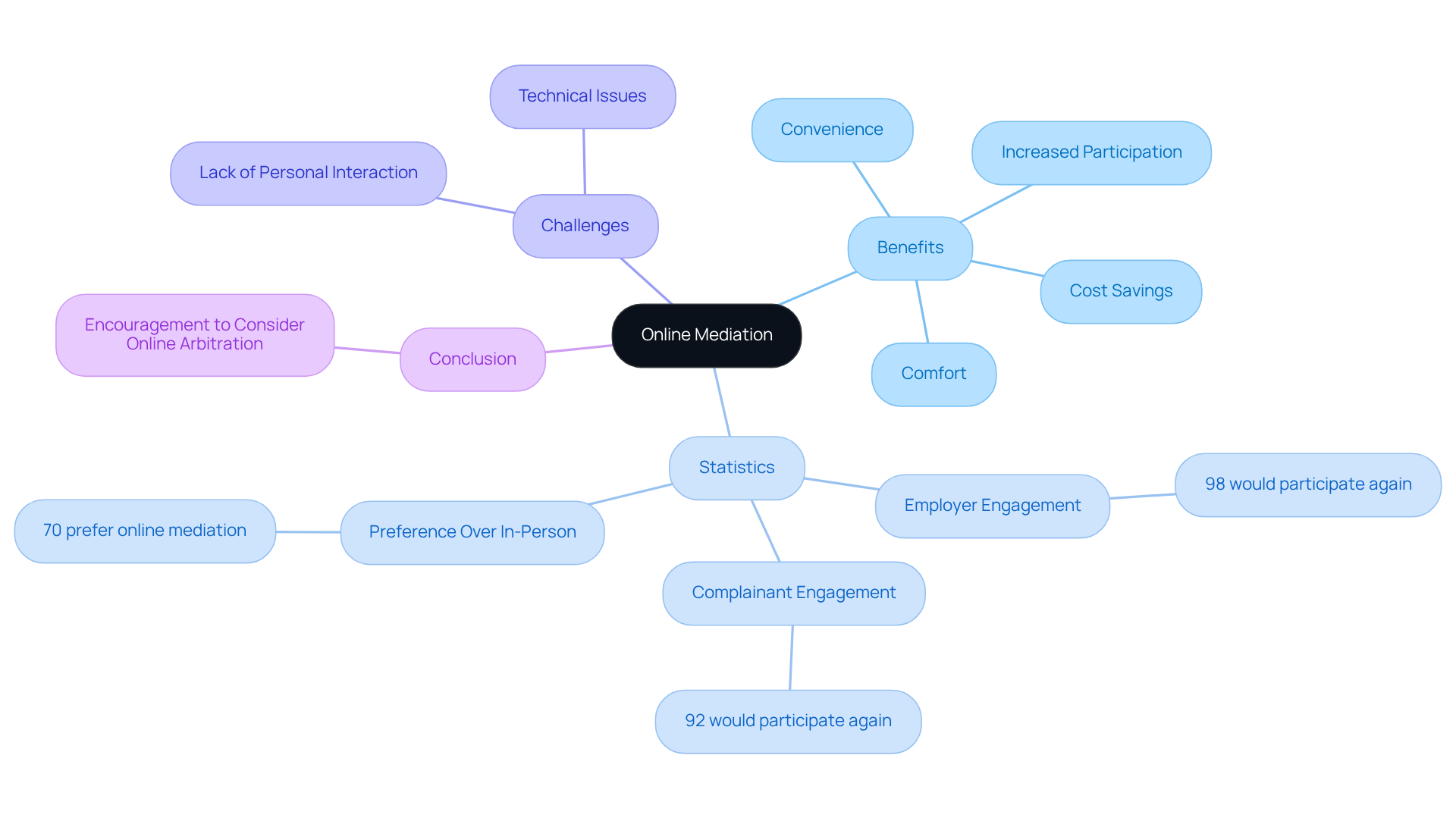
Transformative Mediation: Fostering Change in Relationships Through Dialogue
Transformative negotiation is a powerful approach that emphasizes empowering individuals to change their interactions and relationships. It goes beyond merely resolving issues; it encourages us to appreciate one another's viewpoints, fostering a deeper mutual understanding. By creating a secure environment for discussion, transformative conflict resolution equips individuals with the skills needed to handle future disputes more effectively.
Mediators play a crucial role in this process, guiding discussions and highlighting the importance of empathy and recognition in facilitating lasting change. Have you ever felt that your perspective wasn’t understood? Research shows that approximately 70% of participants report enhanced relationships following transformative conflict resolution, underscoring its effectiveness.
Successful examples can be found in various settings, such as the Market Basket negotiation meeting, where groups not only addressed their disagreements but also strengthened their relationships. Psychologists emphasize that fostering change through dialogue is essential. This approach allows individuals to engage meaningfully and collaboratively, paving the way for healthier interactions in the future.
The Rashomon Effect illustrates the importance of recognizing diverse viewpoints in conflict resolution, further emphasizing the role of empathy in transformative dialogue. Together, we can create a more understanding and compassionate world, one conversation at a time.
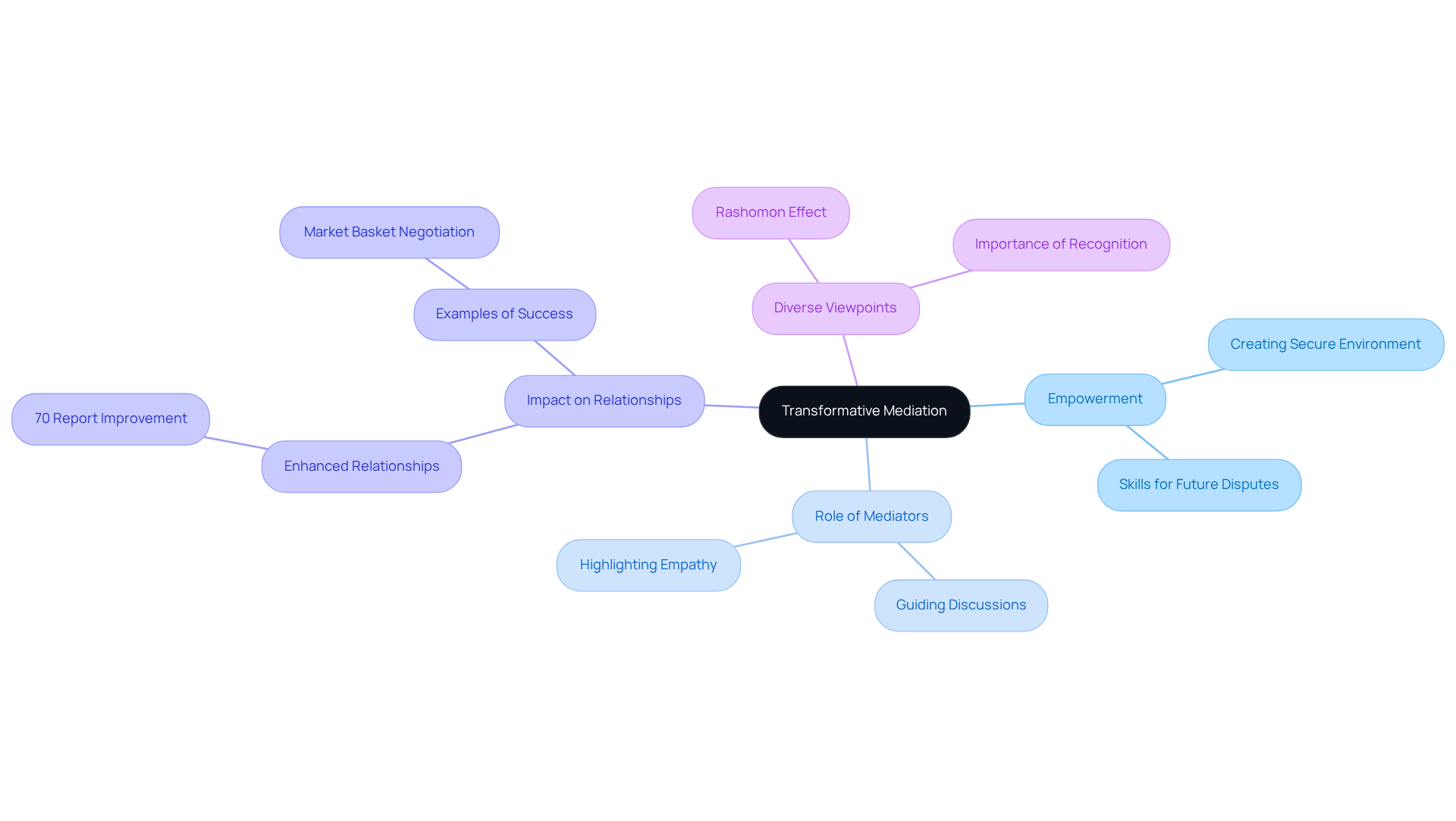
Evaluative Mediation: Providing Expert Assessments to Guide Resolutions
Evaluative negotiation is one of the mediation types that provides a structured approach where a mediator thoughtfully assesses the strengths and weaknesses of each side's case. This method provides valuable insights and suggestions that can help lead to resolution. Have you ever found yourself in a conflict where an expert's perspective could illuminate possible outcomes? This approach shines in such situations, as the mediator actively engages with both parties to clarify the implications of their positions and encourage exploration of different mediation types for settlement options.
By offering a reality check, evaluative facilitation enhances understanding and significantly increases the likelihood of reaching informed and satisfactory agreements. Did you know that approximately 70% of groups achieve agreements after evaluative facilitation sessions? This statistic underscores its effectiveness. Successful cases, such as those highlighted in 'Creative Solutions in Mediation,' demonstrate how expert evaluations can guide individuals through complex conflicts, leading to innovative solutions that might not have been considered otherwise.
Legal specialists, including David H. Wallace, emphasize the crucial role of various mediation types, such as evaluative facilitation, in conflict management. It provides a framework for parties to grasp their legal standing and the potential risks involved, fostering a more constructive negotiation atmosphere. However, it's essential to remain mindful of possible drawbacks, such as the risk of escalating conflict or coercion during evaluative negotiation. Therefore, we encourage you to thoughtfully assess your unique situation when deciding whether this approach is right for you.
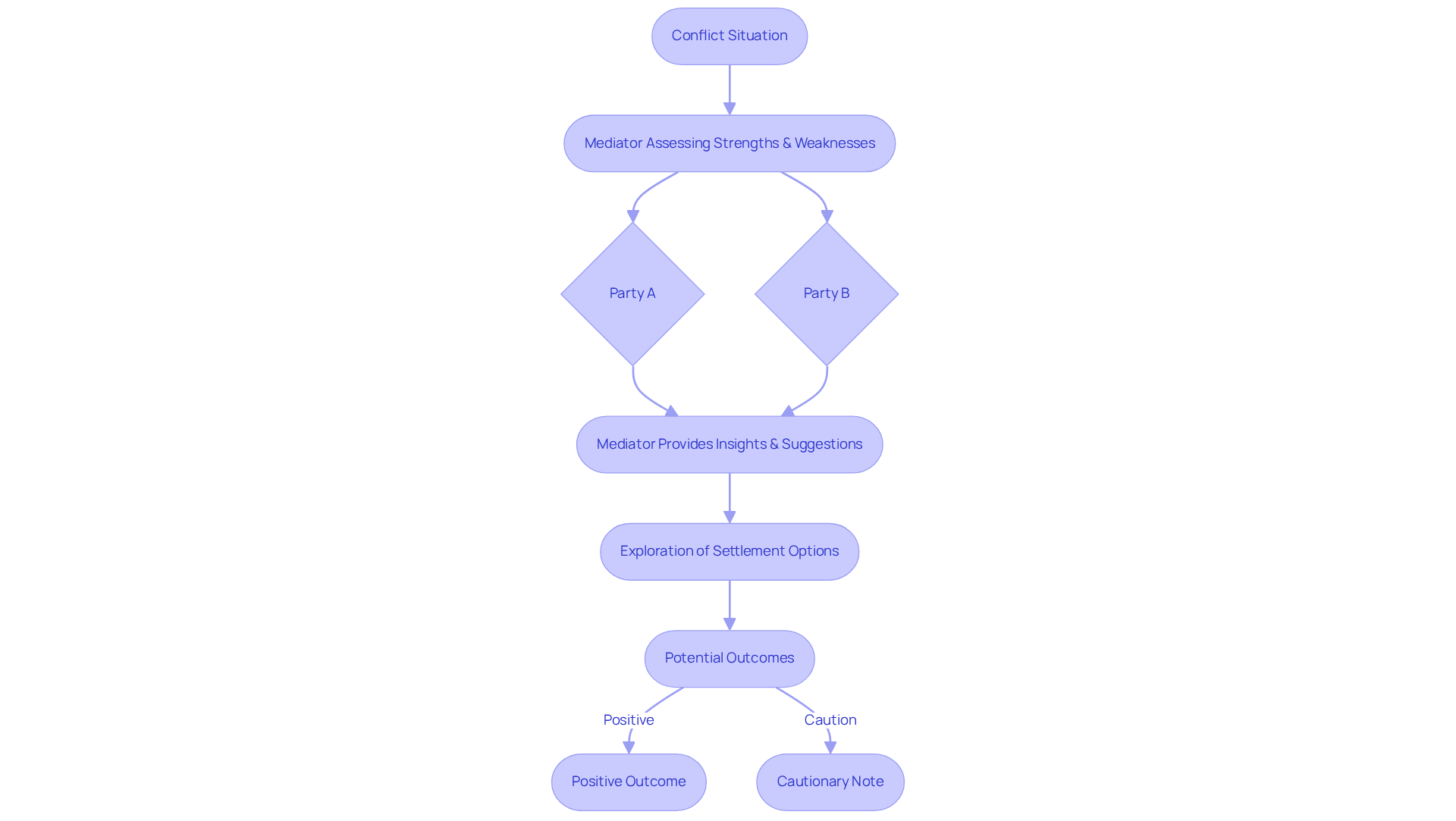
Conciliation: A Collaborative Approach to Conflict Resolution
Conciliation is a process where a neutral third individual, known as a conciliator, facilitates discussions between conflicting groups to help them reach a mutually acceptable agreement. Have you ever found yourself in a situation where misunderstandings led to tension? Unlike conventional mediation types, where the mediator mainly facilitates conversation, conciliation frequently entails the conciliator actively proposing solutions and recommendations to guide the involved individuals toward resolution. This collaborative method not only promotes open communication but also nurtures a sense of partnership, enabling everyone to work together towards common interests and objectives.
Successful examples of conciliation demonstrate its effectiveness in fostering collaborative agreements. For instance, in workplace conflicts, conciliation has been shown to enhance relationships and communication, resulting in resolutions that maintain professional connections. Research indicates that nearly 80% of participants in conciliation processes express contentment with the results. Isn’t it reassuring to know that this method can tackle underlying issues while reducing discord?
Views from seasoned mediators highlight the effectiveness of conciliation in resolving conflicts. Many practitioners advocate for this approach, noting that it often results in more amicable resolutions compared to traditional adversarial methods. By focusing on collaboration rather than confrontation, conciliation not only resolves disputes but also strengthens relationships. This makes it a valuable tool in the context of different mediation types for conflict resolution. Additionally, active listening is essential in various mediation types, ensuring that all voices are heard and fostering a more inclusive environment for resolution. Together, we can embrace conciliation as a pathway to understanding and harmony.
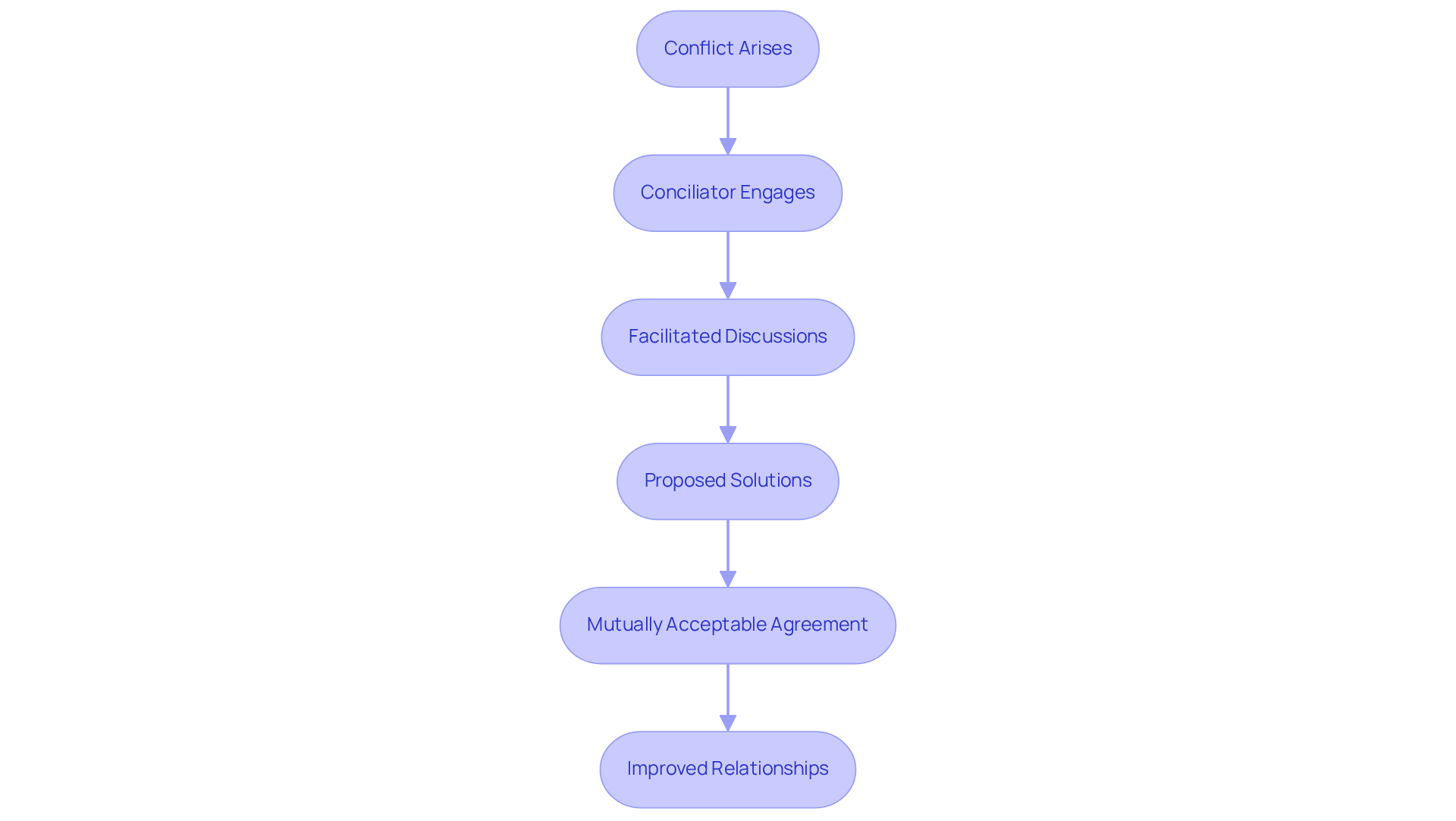
Conclusion
Mediation emerges as a vital tool for resolving conflicts in our lives, whether they arise in personal relationships or complex business negotiations. The various types of mediation discussed throughout this article showcase its adaptability and effectiveness, meeting the unique needs of individuals and organizations alike. As mediation continues to gain traction—with predictions indicating a significant increase in its adoption by 2025—it's essential to recognize its role in fostering understanding and collaboration.
Key insights from this article illustrate the transformative power of mediation in different settings:
- Family mediation highlights the importance of communication and preserving relationships.
- Workplace mediation enhances employee relations and nurtures a positive corporate culture.
- Commercial mediation offers businesses a cost-effective alternative to litigation.
- Community mediation strengthens local ties by addressing disputes amicably.
- Peer mediation empowers individuals, especially youth, to develop essential conflict resolution skills.
- Online mediation provides accessible solutions in our increasingly digital world.
Each type contributes to a more harmonious environment, underscoring the importance of mediation in contemporary conflict resolution.
Ultimately, embracing various mediation types can lead to profound changes in how we perceive and resolve conflicts. By fostering open dialogue, encouraging empathy, and promoting collaborative problem-solving, mediation not only addresses immediate disputes but also builds a foundation for healthier relationships in the future. The call to action is clear: consider the myriad benefits of mediation in your own life or organization. Explore how these essential techniques can transform conflict into opportunity, paving the way for understanding and connection.
Frequently Asked Questions
What services does Conclude ADR offer?
Conclude ADR offers a diverse selection of mediation types tailored to meet the unique needs of individuals and organizations facing disputes.
Why is mediation becoming a preferred method for resolving conflicts?
By 2025, it is anticipated that around 70% of individuals will choose mediation as their preferred method for conflict resolution due to its efficiency and effectiveness.
How does Conclude ADR ensure a positive mediation experience?
Conclude ADR provides a resolution-focused approach, flexible scheduling options, a responsive team, and a streamlined booking process to enhance accessibility and support clients in managing conflicts.
Can you provide an example of a successful mediation case handled by Conclude ADR?
A successful case includes the resolution of a slip and fall incident, showcasing Conclude ADR's effectiveness in settling serious conflicts quickly and affordably.
What is the significance of family mediation?
Family mediation is essential for resolving conflicts in sensitive matters such as divorce, child custody, and inheritance, fostering effective communication and preserving relationships.
How do mediators contribute to family conflict resolution?
Mediators ensure that every voice is heard, facilitating discussions that meet the needs and interests of all family members involved.
What are the benefits of family conflict resolution compared to traditional litigation?
Families engaging in alternative dispute resolution often report higher satisfaction levels with outcomes, as it fosters amicable resolutions and minimizes emotional distress.
What role does workplace mediation play?
Workplace mediation addresses conflicts between employees, teams, or management, aiming to restore harmony and enhance communication within the professional environment.
Why are companies shifting towards alternative dispute resolution in the workplace?
Many firms recognize the cost-effectiveness and greater satisfaction of alternative dispute resolution compared to traditional litigation, leading to a proactive approach in resolving workplace conflicts.
How does workplace mediation benefit employees and organizations?
Workplace mediation equips employees with conflict resolution skills, fosters cooperation, and can transform team dynamics, ultimately enhancing employee relations and workplace culture.


